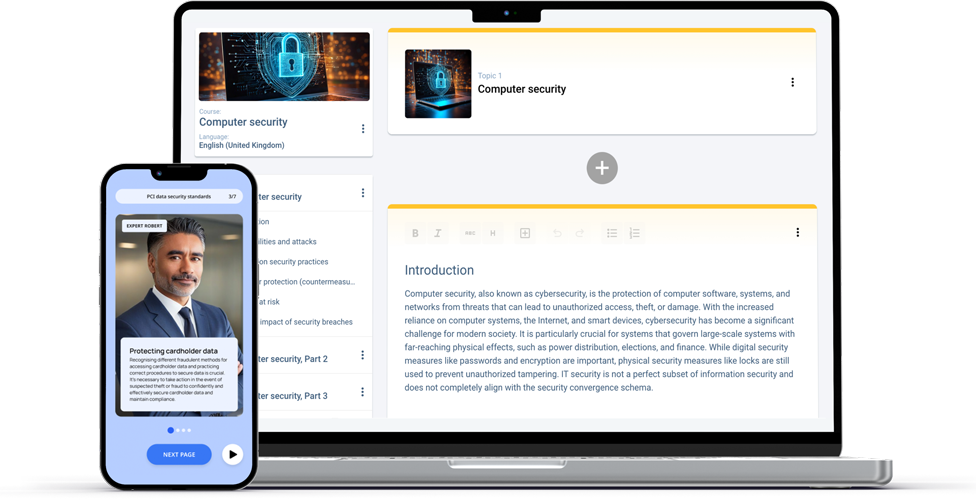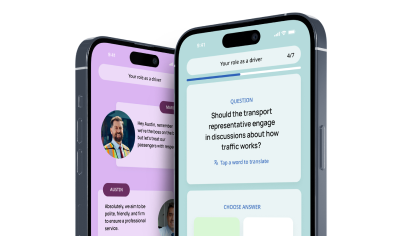Top 10 ideas for soft skills training for employees

1. Communication skills: creating open dialogue workshops
Effective communication is the cornerstone of successful teamwork and collaboration. Employees can enhance their verbal and non-verbal communication skills by organising open dialogue workshops. These workshops can include role-playing, active listening exercises, body language, and public speaking practice.
Open dialogue workshops provide employees with a safe and supportive environment to practice and improve their communication skills. Role-playing scenarios allow participants to step into different perspectives and develop empathy, essential skills for effective communication. Active listening exercises help individuals understand the importance of listening attentively and responding thoughtfully, fostering better understanding and connection within teams.
Furthermore, public speaking practice in these workshops can boost employees' confidence in expressing their ideas and opinions in front of others. By providing constructive feedback and guidance, facilitators can help individuals refine their communication style and delivery, ultimately enhancing their overall and important communication skills and effectiveness in the workplace.
2. Leadership skills: implementing mentorship programs
Developing leadership skills is crucial for employees who aspire to managerial roles. Mentorship programs provide opportunities for experienced leaders to guide and support their mentees. Regular coaching sessions allow employees to enhance their leadership capabilities, decision-making skills, written communication, and strategic thinking.
Effective mentorship programs benefit not only the mentees but also the mentors themselves. Mentors can refine their coaching and communication skills, gain fresh perspectives from their mentees, and even learn new approaches to leadership from the younger generation. This reciprocal relationship fosters a culture of continuous learning and growth within the organisation.
Furthermore, mentorship programs can create a sense of community and camaraderie among employees. By connecting individuals from different departments or levels within the company, these programs break down silos and encourage collaboration. Mentors and mentees often develop strong bonds that extend beyond the professional sphere, leading to a more cohesive and supportive work environment.
3. Teamwork: facilitating team-building retreats
Strong teamwork is essential for achieving organisational goals. Facilitating team-building retreats can foster collaboration, trust, and camaraderie among employees and managers. These retreats can encompass team-building activities, problem-solving challenges, and opportunities for social interaction.
Team-building retreats are a fun way to break the monotony of the office environment but also provide a platform for employees to get to know each other personally. Engaging in activities outside of work tasks can help team members discover hidden talents and strengths in their colleagues, leading to a deeper appreciation for each other's unique skills.
Furthermore, team-building retreats often include workshops or sessions led by professional facilitators who enhance team dynamics. These experts can provide valuable insights and strategies for improving communication, resolving conflicts, developing skills, and building a more cohesive team. By investing in such retreats, organisations demonstrate their commitment to nurturing a positive work culture and strengthening the bonds between team members.
4. Problem-solving: hosting hackathon-style challenges
Problem-solving skills enable employees to analyse complex situations, generate innovative ideas, and implement effective solutions. Hosting hackathon-style challenges provides a platform for employees to collaborate, think critically, and apply their problem-solving abilities in a competitive environment.
Organising a hackathon-style challenge involves setting a specific problem statement or theme for participants to work on within a defined time frame. This challenging format encourages creativity and teamwork as individuals from different departments or teams brainstorm and develop solutions. It also fosters a sense of camaraderie and healthy competition among participants, driving them to push their boundaries and come up with out-of-the-box ideas.
Moreover, hackathons often attract top talent within an organisation as they offer a unique opportunity for individuals to showcase their skills and creativity in a high-pressure, time-constrained setting. Participants get to demonstrate their problem-solving abilities and enhance their communication and presentation skills as they pitch their ideas to a panel of judges or stakeholders. This experience can be invaluable for personal and professional growth, as it challenges individuals to think on their feet and adapt to changing circumstances swiftly.
5. Adaptability: conducting scenario-based training sessions
Today, adaptability is crucial for organisational success. Conducting scenario-based training sessions allows employees to navigate unfamiliar situations, make quick decisions, and embrace change. These sessions can involve simulated scenarios, case studies, and role-playing exercises.
Scenario-based training prepares employees for real-world challenges by immersing them in hypothetical situations that mirror potential workplace scenarios. Employees can develop problem-solving skills, enhance their decision-making abilities, and build confidence in handling unexpected events by engaging in these exercises. Moreover, scenario-based training encourages teamwork and collaboration as employees work together to overcome challenges and achieve common goals.
Furthermore, scenario-based training sessions can be customised to suit different organisational departments, ensuring that employees receive targeted training relevant to their specific roles and responsibilities. This tailored approach helps employees apply their learning directly to their daily tasks, improving overall performance and productivity. Additionally, by incorporating feedback mechanisms into these sessions, organisations can continuously refine and enhance their training programs to meet the evolving needs of their workforce.
6. Time management: implementing time-blocking techniques
Time management skills are crucial in the fast-paced world of work. They allow employees to prioritise tasks, meet deadlines, and maintain high productivity. One effective strategy for mastering time management is implementing time-blocking techniques. This method empowers individuals to allocate their time efficiently, ensuring that each moment is utilised effectively and minimising time wasted on non-essential activities.
When employing time-blocking techniques, individuals create a structured schedule by dividing their day into distinct time blocks dedicated to specific tasks. By assigning set periods for different activities, such as meetings, project work, and breaks, individuals can focus on one task at a time, increasing concentration and productivity. Moreover, individuals can enhance their efficiency and output by minimising distractions during these time blocks.
7. Creativity: encouraging creative thinking workshops
Encouraging employees to think outside the box can lead to innovative solutions and fresh perspectives. Creative thinking workshops allow employees to explore new ideas, brainstorm, and cultivate creativity. These workshops can incorporate brainstorming sessions, mind-mapping activities, and design-thinking exercises.
One key aspect of fostering creativity in the workplace is creating an environment that encourages risk-taking and experimentation. Organisations can unlock a wealth of innovative thinking by providing a safe space for employees to share their wild ideas without fear of judgment. Creative thinking workshops are vital in establishing a supportive culture within teams.
Moreover, creativity is not limited to specific roles or departments within a company. Encouraging cross-functional collaboration in creative thinking workshops can lead to diverse perspectives and out-of-the-box solutions. The results can be groundbreaking when individuals from different backgrounds and skill sets come together to brainstorm and innovate. These workshops serve as a melting pot of ideas, sparking creativity and fostering a culture of innovation across the entire organisation.
8. Emotional intelligence: offering EI assessment and coaching
Emotional intelligence plays a vital role in building strong relationships, managing conflicts, and inspiring others. Offering emotional intelligence (EI) assessments and coaching can help employees develop self-awareness, empathy, and social skills. This practice involves assessing individuals' EI levels and providing targeted coaching to enhance their emotional intelligence capabilities.
Emotional intelligence (EI) is crucial in the workplace, personal relationships, and everyday interactions. By understanding and managing emotions effectively, individuals can easily navigate social complexities and foster positive connections with those around them. EI assessments typically involve questions and scenarios designed to evaluate an individual's emotional awareness, self-regulation, and relationship management skills.
Coaching sessions on emotional intelligence often delve into real-life scenarios and role-playing exercises to help individuals apply their newfound knowledge in practical situations. By honing their emotional intelligence, employees can become more adept at handling stress, communicating effectively, and building rapport with colleagues and clients. Investing in EI assessment and coaching can lead to a more harmonious and productive work environment.
9. Conflict resolution: role-play and conflict resolution exercises
Conflict is common in any workplace, arising from differences in opinions, personalities, or work styles. However, practical conflict resolution skills can transform these conflicts into valuable opportunities for personal and professional growth and foster a culture of collaboration and understanding within the team.
Role-playing and conflict-resolution exercises are potent tools for equipping employees with the necessary skills to navigate and resolve conflicts effectively. By engaging in simulated scenarios, individuals can practice managing challenging situations, develop their ability to empathise with others' perspectives and hone their negotiation and interpersonal skills to reach mutually beneficial outcomes. These exercises enhance individual conflict resolution capabilities and contribute to building a harmonious and productive work environment.
10. Critical thinking: organising thought leadership forums
Critical thinking skills are necessary for analysing complex problems, evaluating information, and making informed decisions. Organising thought leadership forums allows employees to engage in intellectual conversations, share diverse perspectives, and sharpen their critical thinking abilities. These forums can feature guest speakers, debates, and interactive discussions.
By creating a platform for thought leadership forums within an organisation, employees can benefit from exposure to a wide range of ideas and viewpoints. This exposure can help individuals develop a more well-rounded approach to problem-solving, performance management, and decision-making as they learn to consider multiple perspectives before reaching conclusions. Additionally, thought leadership forums can foster collaboration and innovation within the workplace, encouraging employees to think creatively and challenge conventional wisdom.
Furthermore, thought leadership forums allow employees to network with industry experts and thought leaders, expanding their professional connections and knowledge base. Engaging in discussions with external speakers can offer fresh insights and inspire new ways of thinking, contributing to employees' continuous growth and skill development. Fostering a critical thinking culture through thought leadership forums can lead to enhanced problem-solving skills, increased creativity, and a more dynamic and forward-thinking workforce.





